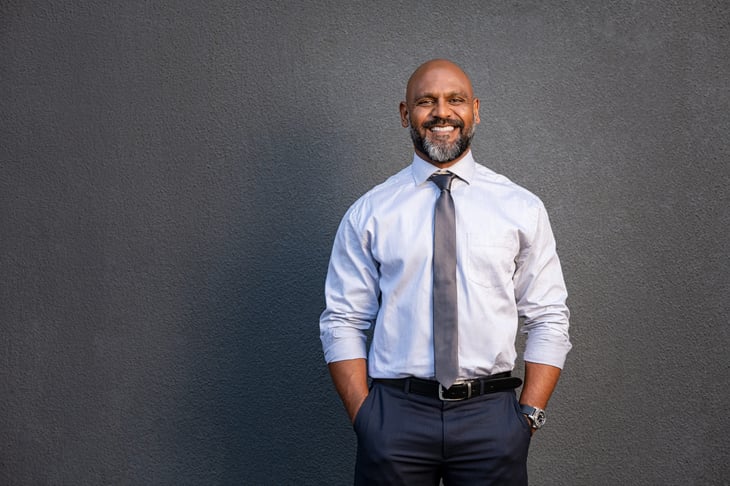
Editor’s Note: This story originally appeared on NewRetirement.
If you are asking, “Am I ready to retire?” Here is some good news: You don’t necessarily need $1 million for a successful retirement. So, what you do need? We did a little digging, and here are eight important skills that will enable you to achieve financial security, health and the best most secure retirement possible.
Find out if you have the skills … to pay the retirement bills … and feel confident about the “Am I ready to retire” question.
To be prepared to really thrive in this phase of your life, the following are the eight skills you need.
1. A Knack for Dealing With Uncertainty

The best retirement plans strive to guarantee adequate retirement income no matter what happens in life. No matter how long you live. … No matter whether the stock market goes up or down. … No matter if you have a heart attack or are in a car accident. … You want to be sure you still have enough money to spend each month.
However, no one can tell the future, and, at some point, there needs to be a leap of faith. You need to know how to deal with uncertainty.
Carl Richards, a CFP and personal finance columnist with The New York Times, writes that stress and doubt plague all retirees: “I’ve met with people who have more money than they could ever spend, and they’re absolutely convinced that tomorrow will be the day it all disappears. In fact, in my experience, there is very little correlation between net worth and a personal sense of financial security.”
If you feel this stress, Richards suggests that you learn to be okay with risk and to remind yourself of all the things you can control: budgeting, monitoring and adjustment of investments, getting an extra job, downsizing, cutting expenses and more.
He then says: “Now, look at that list and put a big, fat checkmark next to everything you’ve addressed to the best of your ability. Whatever you didn’t check off, take some time and effort to work on it.”
2. Resilience: Can You Overcome Adversity?

My grandmother had a massive stroke at the age of 90. When she was in the intensive care unit, we overheard the nurses refer to her as a TOB. When we asked them what that meant, thinking it was some important medical term, they explained that it stood for Tough Old Broad and that it was a complimentary term they used for older patients who they believed to have the grit to overcome a major health event.
In other words, they thought my grandmother was resilient. They were right, even at her advanced age, she did indeed overcome this major health event and continue living for another five years.
There is no doubt that you will deal with some difficulties throughout your retirement. Resilience — the capacity to recover quickly from difficulties — is what you need to keep going.
Psychology Today says that the factors that make someone resilient include: “a positive attitude, optimism, the ability to regulate emotions and the ability to see failure as a form of helpful feedback.”
Foster these attitudes in yourself for the best retirement.
3. Capability to Maintain a Set of Friends

Recent research suggests that loneliness can be a huge threat to health. In fact, the dangers of loneliness are on par with obesity, light smoking and anxiety.
We say it all the time, “Keep in touch.” Well, in retirement, it is more important than ever to actually do it. Maintaining your social connections is critically important to your well-being and chances of having the best retirement.
Call up a friend for a walk. Have a standing date for coffee every morning with friends. Keep in touch with colleagues you had at work by having lunch every once in a while. No matter what you do, it is important to nurture and participate in your social networks.
4. Mastery of Your Cash Flow

After you retire, you have a fairly fixed set of financial resources that you need to make last for the rest of your life. You won’t have a new paycheck, bonus or big raise to bail you out.
As such, you need to have a mastery of your cash flow as well as the diligence to monitor your budget on a regular basis and make adjustments as necessary.
- Know what you are spending on what and cut wasteful expenses.
- Balance the budget! Make sure that you have the resources to cover your expenses — each month and for as long as you live.
- Plan big expenditures like travel, a new car or holiday gifts carefully.
- Continue to adjust your plans based on investment returns, inflation and other economic factors.
5. Ability to Set Your Own Schedule and Stay Motivated

Am I ready to retire? Don’t answer yes unless you are ready to take charge of your own time.
Most of us went to school, and soon after we got a job. Our whole lives have been pretty scheduled by external demands: when to get out of bed, where we need to be, who we will see, what we will do and more.
Retirement is the first time in our lives when we have almost complete control over our own schedules. And, many retirees really struggle to figure out what they want to do and the motivation to do it.
Experts say it is important to find a hobby and not just let every moment form itself. Develop a new routine, set goals and have a purpose for each day.
6. Can You Relax? Stop Working?

I know someone who will probably never retire. And, he shouldn’t. He is someone who thrives when solving a problem. He is most relaxed when he has a clear goal, a place to go, networks to call and people to help. His identity is wrapped up in what he does.
Never mind the fact that hanging out on a beach makes him restless and grouchy.
If you don’t enjoy rest and relaxation, make sure that you have something tangible to fill the void when you retire. It is also important to remember that retirement is not for everyone.
It is okay to love your job and keep at it.
Love work, but want a bit less responsibility? Try going part-time. Or what about volunteering?
7. Capacity to Have a Purpose and Follow Passions

Retirement is your time — your time to be who you want to be. You may (or may not) be hampered by finances, but your time and beliefs are your own, and retirement is an ideal time to identify a purpose and follow your passions.
Without a plan for life after retirement, many retirees find themselves feeling vaguely unfulfilled and restless, craving something more but not knowing what that something might be.
Try writing a retirement manifesto, explore ways to find meaning or consider hiring a retirement coach who can help you prepare for what happens when your career ends.
Try figuring out your ikigai! (That’s Japanese for “reason for being.”)
8. Am I Ready to Retire? Make Sure You Have Built a Detailed Retirement Plan

We touched on the importance of cash flow and budgeting above. That is an important part of retirement planning, but there is more to it all than just reconciling the cash flow.
A comprehensive retirement plan is necessary if you want to feel and be secure into your future. You need to have a plan for long-term care and know what to do if something unexpected happens to your finances.
